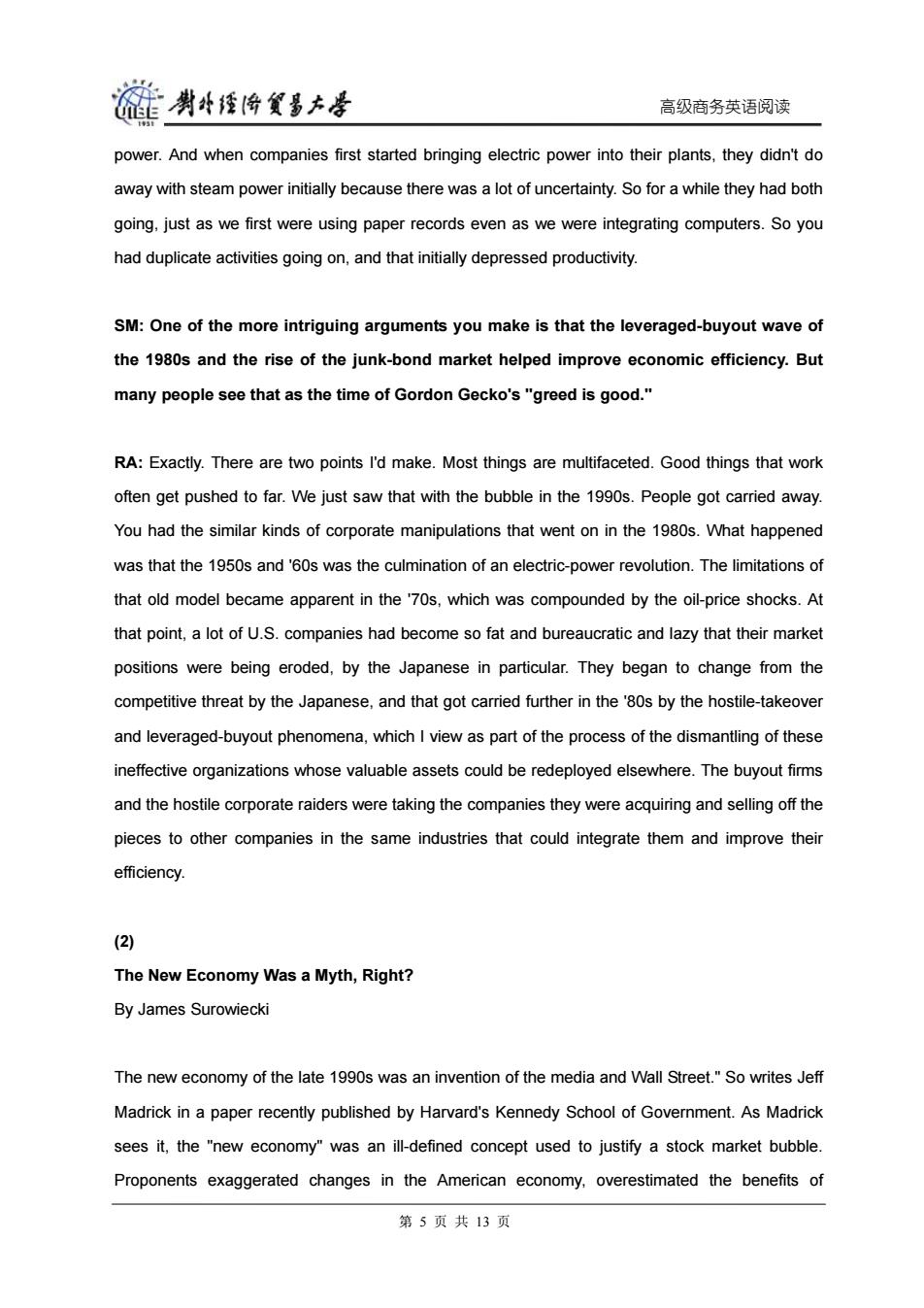正在加载图片...

喇牛煙将多大是 高级商务英语阅读 power.And when companies first started bringing electric power into their plants,they didn't do away with steam power initially because there was a lot of uncertainty.So for a while they had both going,just as we first were using paper records even as we were integrating computers.So you had duplicate activities going on,and that initially depressed productivity. SM:One of the more intriguing arguments you make is that the leveraged-buyout wave of the 1980s and the rise of the junk-bond market helped improve economic efficiency.But many people see that as the time of Gordon Gecko's"greed is good." RA:Exactly.There are two points I'd make.Most things are multifaceted.Good things that work often get pushed to far.We just saw that with the bubble in the 1990s.People got carried away. You had the similar kinds of corporate manipulations that went on in the 1980s.What happened was that the 1950s and '60s was the culmination of an electric-power revolution.The limitations of that old model became apparent in the '70s,which was compounded by the oil-price shocks.At that point,a lot of U.S.companies had become so fat and bureaucratic and lazy that their market positions were being eroded,by the Japanese in particular.They began to change from the competitive threat by the Japanese,and that got carried further in the '80s by the hostile-takeover and leveraged-buyout phenomena,which I view as part of the process of the dismantling of these ineffective organizations whose valuable assets could be redeployed elsewhere.The buyout firms and the hostile corporate raiders were taking the companies they were acquiring and selling off the pieces to other companies in the same industries that could integrate them and improve their efficiency. (2) The New Economy Was a Myth,Right? By James Surowiecki The new economy of the late 1990s was an invention of the media and Wall Street."So writes Jeff Madrick in a paper recently published by Harvard's Kennedy School of Government.As Madrick sees it,the "new economy"was an ill-defined concept used to justify a stock market bubble. Proponents exaggerated changes in the American economy,overestimated the benefits of 第5页共13页高级商务英语阅读 power. And when companies first started bringing electric power into their plants, they didn't do away with steam power initially because there was a lot of uncertainty. So for a while they had both going, just as we first were using paper records even as we were integrating computers. So you had duplicate activities going on, and that initially depressed productivity. SM: One of the more intriguing arguments you make is that the leveraged-buyout wave of the 1980s and the rise of the junk-bond market helped improve economic efficiency. But many people see that as the time of Gordon Gecko's "greed is good." RA: Exactly. There are two points I'd make. Most things are multifaceted. Good things that work often get pushed to far. We just saw that with the bubble in the 1990s. People got carried away. You had the similar kinds of corporate manipulations that went on in the 1980s. What happened was that the 1950s and '60s was the culmination of an electric-power revolution. The limitations of that old model became apparent in the '70s, which was compounded by the oil-price shocks. At that point, a lot of U.S. companies had become so fat and bureaucratic and lazy that their market positions were being eroded, by the Japanese in particular. They began to change from the competitive threat by the Japanese, and that got carried further in the '80s by the hostile-takeover and leveraged-buyout phenomena, which I view as part of the process of the dismantling of these ineffective organizations whose valuable assets could be redeployed elsewhere. The buyout firms and the hostile corporate raiders were taking the companies they were acquiring and selling off the pieces to other companies in the same industries that could integrate them and improve their efficiency. (2) The New Economy Was a Myth, Right? By James Surowiecki The new economy of the late 1990s was an invention of the media and Wall Street." So writes Jeff Madrick in a paper recently published by Harvard's Kennedy School of Government. As Madrick sees it, the "new economy" was an ill-defined concept used to justify a stock market bubble. Proponents exaggerated changes in the American economy, overestimated the benefits of 第 5 页 共 13 页